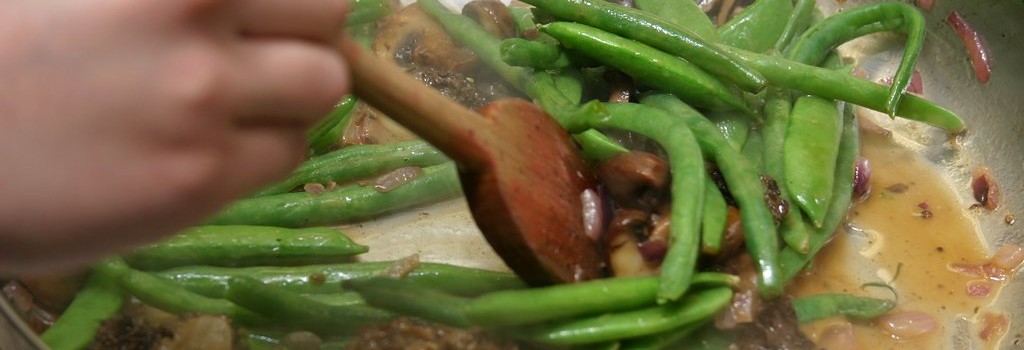Beginner Cooking Tips
Before you begin, you should know…
Cooking is not as hard as you may think. Don’t be afraid to try something new or out of your comfort zone. It’s okay if things don’t turn out perfectly. It’s also okay to keep it simple and easy. You have to find what works for you. Learning to cook is actually a life-long journey. You just have to start somewhere.
Cooking your own meals is the best way to know what’s in your food and therefore what you are putting into your body. It’s also the most budget-friendly way to eat. Both of these things make it worth the time and effort!
Getting Started
- After you find a recipe you want to try, make sure you have ALL of the ingredients before you begin cooking.
- Read through the recipe thoroughly to make sure you haven’t missed any ingredients, you have the proper utensils and pots/pans, and you understand all the steps. You don’t want to realize after you put the chicken in the frying pan that it was supposed to marinate overnight. Marinating is too beautiful to skip.
- It is completely okay to swap out (certain) ingredients for ones that are cheaper or ones that you happen to have on hand. For instance, you don’t need to run to the market just to get Smoked Gouda cheese. If you have sharp cheddar in the fridge, it will likely still be perfect cheesy goodness. Please note that this rule does not apply to baking. Baking is, after all, a science!
- Prep all your ingredients before you actually begin cooking and assembling. Chop your veggies, pull out your spices, cut up your meat, etc. I even suggest locating the pots and pans you plan to use. This will make you more at ease throughout the cooking process and more attentive to what’s on the stove. It will help you avoid that moment when you realize it’s time to put the onions in, but there the onion sits, unpeeled and untouched.
- Taste as you go! It is okay to add more salt, hot sauce, sugar, or any other spice if you think it needs it. This will actually help you grow more confident in the kitchen. One exception to this rule: raw meat. Please don’t taste that as you go.
- Set your timer for 5-10 minutes EARLIER than a recipe states. All ovens are different and temperatures vary greatly. Checking it sooner will give you a chance to catch it before it is overdone. Eventually, you’ll get to know your oven intimately. Until then, proceed with caution.
Cooking FYIs
- Don’t walk away from something cooking on the stove. Things burn in a split second. It’s best to stay close.
- Preheat skillets and pans BEFORE sautéing veggies or adding meat. This will keep food from sticking and will ensure that the meat actually browns. That’s where the flavor is!
- Use paper towels to dry meat and fish before cooking it. A dryer exterior will help it brown, which, again, means more flavor!
- Allow meat to rest after it’s cooked and before you cut into it. If you cut it right away, all of the juices will run out and you will be left with a dry, tough piece of meat. Wait until juices have returned to the center of the meat. Here are general resting times:
- Whole chickens or large roasts: 15 minutes
- Steaks or chops: 5 minutes
- If you have the funds and you eat meat, invest in a meat thermometer. They aren’t too expensive; you can easily find them for around $10 on Amazon or in Home Goods. Using this tool will help you cook meat and poultry to safe temperatures without overcooking it. It will also come with a list of the safe temperatures for each meat.
- Always make enough to have leftovers! It only takes a few extra minutes to double a recipe, and then you have meals to enjoy throughout the week.
- Crockpots are a wondrous thing. I use them all year long. If I had to choose one appliance to take to a deserted island with me, it would be my crockpot. You can make casseroles, soups, roasts, dips, and much more in a crockpot. You can do that in an oven, too, you say? Yes, but you will likely start a fire if you walk away from a casserole in the oven for 8 hours. With crockpots, you truly can set it and forget it! This is a time saver, because you can just throw the ingredients in and walk away. In the summer, it also prevents your house from heating up (which does happen when you use your oven).
- When cooking pasta, bring a large pot of water to a rolling boil on the stove. Add a couple tablespoons of salt. Don’t add oil, as this will prevent your sauce from sticking to the pasta later on. Throw in your pasta and cook according to the directions on the box. Once it’s al dente (just barely done), drain it in a colander. Toss it with a little bit of your sauce to keep it from sticking until you serve it.
- Many foods are extremely versatile. Meats, veggies, and tofu can all be cooked in large quantities and then used in many different dishes throughout the week. This saves time and money while also keeping your meals varied and interesting. For example, you can roast a whole chicken on Sunday, and then use that same chicken to make:
- Tacos or quesadillas
- Sandwiches and wraps
- Chicken salad
- Pasta dishes
- Chicken croquettes
- Casseroles
Quick and easy meal ideas:
- Anything in the crockpot
- Salads
- Stir-fry
- Omelets and frittatas

